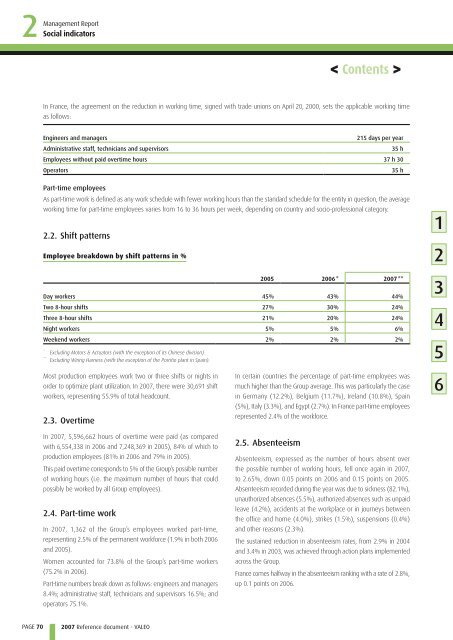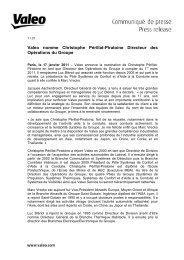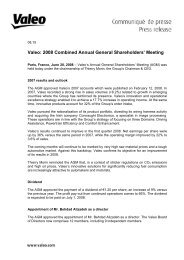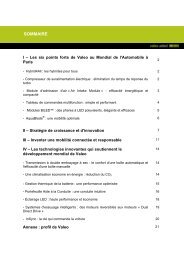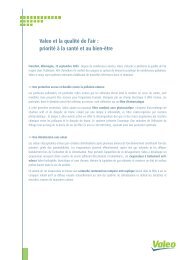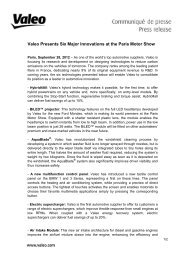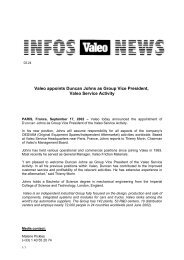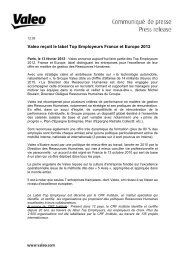2007 Reference document (PDF) - Valeo
2007 Reference document (PDF) - Valeo
2007 Reference document (PDF) - Valeo
You also want an ePaper? Increase the reach of your titles
YUMPU automatically turns print PDFs into web optimized ePapers that Google loves.
2 Management<br />
PAGE 70<br />
Report<br />
Social indicators<br />
In France, the agreement on the reduction in working time, signed with trade unions on April 20, 2000, sets the applicable working time<br />
as follows:<br />
Engineers and managers 215 days per year<br />
Administrative staff, technicians and supervisors 35 h<br />
Employees without paid overtime hours 37 h 30<br />
Operators 35 h<br />
Part-time employees<br />
As part-time work is defined as any work schedule with fewer working hours than the standard schedule for the entity in question, the average<br />
working time for part-time employees varies from 16 to 36 hours per week, depending on country and socio-professional category.<br />
2.2. Shift patterns<br />
Employee breakdown by shift patterns in %<br />
<strong>2007</strong> <strong>Reference</strong> <strong>document</strong> - VALEO<br />
2005 2006 * <strong>2007</strong> **<br />
Day workers 45% 43% 44%<br />
Two 8-hour shifts 27% 30% 24%<br />
Three 8-hour shifts 21% 20% 24%<br />
Night workers 5% 5% 6%<br />
Weekend workers 2% 2% 2%<br />
* Excluding Motors & Actuators (with the exception of its Chinese division).<br />
** Excluding Wiring Harness (with the exception of the Porriño plant in Spain).<br />
Most production employees work two or three shifts or nights in<br />
order to optimize plant utilization. In <strong>2007</strong>, there were 30,691 shift<br />
workers, representing 55.9% of total headcount.<br />
2.3. Overtime<br />
In <strong>2007</strong>, 5,596,662 hours of overtime were paid (as compared<br />
with 6,554,338 in 2006 and 7,248,369 in 2005), 84% of which to<br />
production employees (81% in 2006 and 79% in 2005).<br />
This paid overtime corresponds to 5% of the Group’s possible number<br />
of working hours (i.e. the maximum number of hours that could<br />
possibly be worked by all Group employees).<br />
2.4. Part-time work<br />
In <strong>2007</strong>, 1,362 of the Group’s employees worked part-time,<br />
representing 2.5% of the permanent workforce (1.9% in both 2006<br />
and 2005).<br />
Women accounted for 73.8% of the Group’s part-time workers<br />
(75.2% in 2006).<br />
Part-time numbers break down as follows: engineers and managers<br />
8.4%; administrative staff, technicians and supervisors 16.5%; and<br />
operators 75.1%.<br />
In certain countries the percentage of part-time employees was<br />
much higher than the Group average. This was particularly the case<br />
in Germany (12.2%), Belgium (11.7%), Ireland (10.8%), Spain<br />
(5%), Italy (3.3%), and Egypt (2.7%). In France part-time employees<br />
represented 2.4% of the workforce.<br />
2.5. Absenteeism<br />
< Contents ><br />
Absenteeism, expressed as the number of hours absent over<br />
the possible number of working hours, fell once again in <strong>2007</strong>,<br />
to 2.65%, down 0.05 points on 2006 and 0.15 points on 2005.<br />
Absenteeism recorded during the year was due to sickness (82.1%),<br />
unauthorized absences (5.5%), authorized absences such as unpaid<br />
leave (4.2%), accidents at the workplace or in journeys between<br />
the office and home (4.0%), strikes (1.5%), suspensions (0.4%)<br />
and other reasons (2.3%).<br />
The sustained reduction in absenteeism rates, from 2.9% in 2004<br />
and 3.4% in 2003, was achieved through action plans implemented<br />
across the Group.<br />
France comes halfway in the absenteeism ranking with a rate of 2.8%,<br />
up 0.1 points on 2006.<br />
1<br />
2<br />
3<br />
4<br />
5<br />
6


